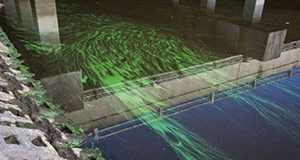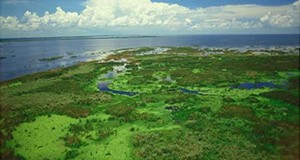Microscopic algae in oceans and inland waters sometimes grow to excessive levels called “blooms.” Warmer water temperatures and increased nutrient levels exacerbate blooms, and when nutrients are high, temperature increases of just a few degrees cause exponential increases of algae and blooms. This 4-page fact sheet written by Karl Havens and published by the Florida Sea Grant College Program and UF/IFAS Extension explains why algal blooms can be harmful and provides advice for communities seeking to reduce nutrient levels in their lakes, streams, and other bodies of water. In a warmer future, harmful algal blooms will be much more challenging to control than they are today.
http://edis.ifas.ufl.edu/sg153
Tag: Harmful Algal Blooms
Natural Climate Variability Can Influence Cyanobacteria Blooms in Florida Lakes and Reservoirs
During the summer, many of Florida's nutrient-enriched lakes and reservoirs experience proliferations of cyanobacteria commonly called “blooms.”. Cyanobacteria are natural in Florida lakes and reservoirs, but when they grow to high levels and bloom, they become a big problem. They look awful, smell bad, and can poison fish and other animals in the water. To help resource managers considering costly remediation projects or evaluating the effectiveness of nutrient reduction strategies to manage the problem, this 7-page fact sheet presents the results from 15 years of studies observing three large, nutrient-rich lakes in Florida (Lake Harris, Lake George, and Lake Okeechobee) to study the relationship between rainfall and cyanobacteria blooms and learn causes of year-to-year bloom variability. Written by Karl E. Havens, Mark V. Hoyer, and Edward J. Phlips and published by the Florida Sea Grant College Program
http://edis.ifas.ufl.edu/sg142

